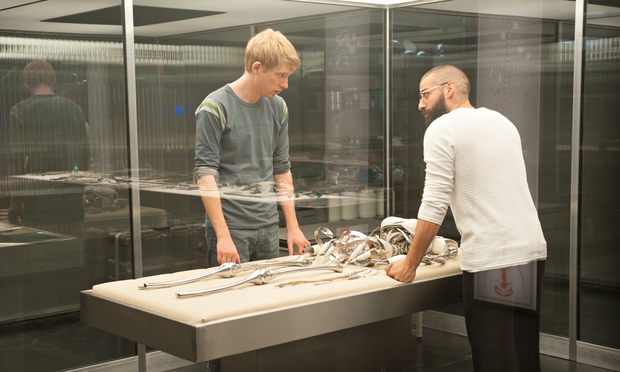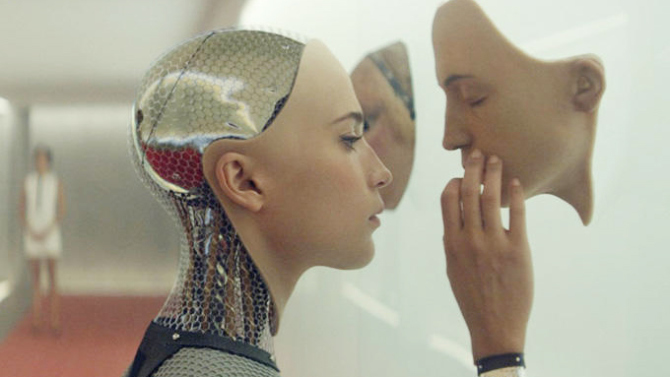Deus?
Artificial intelligences in fiction tend to fall into one of two extremes. They tend to be either Asimov’s unbearable metal saints, or the remorseless killers from The Terminator. Ex Machina is a breath of fresh air, because the machine at the heart of it, Ava, is neither. She’s programmed to be human, like the replicants from Blade Runner, but the mystery of the film is: does she really have human capacities for empathy, or is it merely a simulation? More simply, can she love?
Immediately, you might think of Her, but I can guarantee that Ex Machina is a far less maudlin and sentimental film. There’s a cold, philosophical edge to it which Her (in my opinion) never quite nailed. Our protagonist, Caleb (played by the suitably weedy Domhnall Gleeson) does bear a lot of superficial similarities to Joaquin Phoenix’s character in Her: he’s lonely, a computer guy, a bit of a loser. Ex Machina depicts him very honestly. He’s not the most appealing person of all time; you might sympathise with him, but you probably wouldn’t want to hang out with him.
The yin to his yang is Ava’s inventor, and Caleb’s boss, Nathan (played brilliantly by Oscar Isaac). He’s charming, humorous, prone to alcoholism and bouts of morbidity. He invites Caleb to his laboratory in the wilderness so that he can test Ava and determine whether or not her seeming humanity is feigned or genuine. They’re the only characters in the film, apart from Nathan’s silent maid. The set-up is established within minutes. Ex Machina is a real model for economical storytelling.
Ex Machina often feels very gothic: it has a brooding aristocrat, a beautiful prisoner, and a naive interloper. It was directed by the screenwriter of 28 Days Later. In many ways it’s quite similar in its themes–particularly its depiction of men in isolation and the awful predilections it can bring out. At times it’s genuinely unsettling, even frightening. But these moments are offset by some scenes of weird comedy (there’s a pretty great dance number at one point). It never feels like a mess–rather, the abrupt shifts in tone from comedy, to romance, to horror prevent the film from ever becoming tedious. In less capable hands, Ex Machina could have been a real chore, given its tiny cast and claustrophobic setting.
The film is accomplished in every respect, but really, it’s the exceptional quality of the acting which takes it from good to great. Each of the three leads are fantastic. Alicia Vikander in particular deserves immense credit for her performance as Ava. Like Caleb, we’re constantly scrutinising Ava to see if she really means what she says and does, or if she’s simply pretending. Vikander brings out this tension at the heart of the film with remarkable aplomb. If you like science fiction, thrillers, or drama (or any combination of those three), I can’t recommend Ex Machina highly enough.
9/10
For more Reviews, click here. If you’re digging ReelGood, sign up to our mailing list for exclusive content, early reviews and chances to win big!

